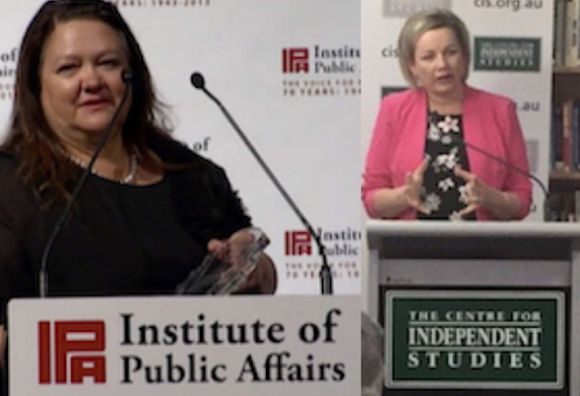The campaign against the Voice to Parliament has ties with companies that have long been misinforming the public about the climate crisis, writes Dr Jeremy Walker.
AUSTRALIANS WILL SOON vote to recognise the deep-time history of First Nations people in its 1901 Constitution and establish an Indigenous Voice to Parliament.
In April, polling suggested the Referendum proposal of the 2017 National Constitutional Convention and Uluru Statement from the Heart enjoyed 60 per cent support.
Since the lead anti-Voice campaign organisation, Advance Australia, began its media offensive, the “Yes” vote has declined to 40 per cent.
Last week, Prime Minister Anthony Albanese observed the “No” campaign relies on spreading fear and disinformation:
"What we’ve had is a whole lot of disinformation out there.” He may have underestimated how long-established, well-organised and highly-coordinated is the political influence infrastructure now running the “No” campaign."
In a recent peer-reviewed article, I recall the history of the Australian “free market” think tanks, institutes and single issue campaign units which have cultivated the public careers of the two Indigenous Australians fronting the “Vote No” campaign and have been provided daily platforms in the national media: Nyunggai Warren Mundine and Senator Jacinta Nampijinpa Price. Upon their faces, the “No” campaign’s optics and social media offensive almost entirely depend.
Looking beyond the false impression of widespread First Nations opposition to the Voice created by constant media attention to Price and Mundine, we may ask, for whom do they speak? What are the motives of the “No” campaign? Which business interests might be silent investors in – and potential financial beneficiaries of – a “No” result? How is the “No” campaign aligned with parallel influence campaigns conducted by the shadowy network of “think tanks” operating in Australia and other nations, such as counter-science disinformation opposing clean energy and climate policy?
Registered as a third-party election campaigner with the Australian Electoral Commission (AEC), Advance no longer names its responsible officers on its public website. In 2019, the Advance Advisory Council included Maurice Newman and Sam Kennard — a board member of the Centre for Independent Studies (CIS), which names Mundine as director of an “Indigenous forum” and Price as an associate.
Led by Advance, the “No” campaign is supported by The Centre for Independent Studies (CIS), the Institute of Public Affairs (IPA) and the Australian conference of the international Far-Right Conservative Political Action Conference (CPAC — until recently, hosted by LibertyWorks), organisations with which Price and Mundine have been associated for years. All have long opposed climate policy. CIS, IPA and LibertyWorks are all affiliated with the little-known global Atlas Network.
Founded in 1981 by the English businessman, Antony Fisher, ‘to litter the world with free-market think tanks’, headquartered in Virginia by the U.S. Capitol, Atlas is not itself a think tank. It discreetly fundraises, networks and expands its vast public opinion, public policy and election influence machinery of 515 “partner organisations” in 100 nations.
Better-known U.S. think tanks include the Heritage Foundation, the Cato, Heartland and Competitive Enterprise institutes. All oppose climate policy and all have documented histories of oil-derived funding, such as from oil billionaires Charles Koch and Richard Scaife, along with ExxonMobil and other multinational corporations.
Limited disclosure laws prevent Australians from knowing who funds the Australian Atlas units, but we do know where the founding grants came from.
In 1976, John Bonython, founder of gas giant Santos, invited Fisher to privately gather support amongst big business for the CIS, an early Atlas institute modelled on Fisher’s prototype neoliberal think tank founded in 1955 — the London-based Institute of Economic Affairs (IEA). By the mid-1970s, IEA’s donors included Shell, BP, Rio Tinto, Exxon and many others, whose identities were carefully concealed from the general public and targeted through the mass media by “free market” opinion demanding privatisation, deregulation and regressive tax cuts.
Foundation CIS grants came from Santos, Shell, BHP, Rio Tinto, Western Mining Corp (WMC) and News Corp’s Adelaide Advertiser. With WMC’s international mining power broker Hugh Morgan, a member of the Atlas Network’s corporate board from 1984, Newman and the late Neville Kennard (of Kennard’s Hire) were closely involved in founding the CIS. The founding board of the IPA included Keith Murdoch and representatives of BHP, WMC and ConZinc (now Rio Tinto).
It is no accident the “No” campaign is being run through the same personnel, organisations and methods of the longstanding, fossil-funded Atlas campaign to misinform the public about climate science, defeat climate policy, block clean energy transition and defeat an effective, binding UN climate treaty — all too familiar to Australians.
The “No” campaign can be safely assumed as being conducted by proxy on behalf of fossil-fuel corporations and their allies, whose efforts to mislead the public on life-and-death matters reach back over half a century.
Around the country, traditional owners are mounting legal battles to stop Santos, Woodside and other transnational oil and gas majors from opening up vast new fossil methane basins: in the Pilliga, Tiwi Islands and Murujuga/Burrup, the world’s largest art gallery, with some works over 20,000 years old.
Opposition to constitutional justice for Indigenous Australians can be traced to fears the Voice might enhance the capacity of Australian parliamentary democracy to rein in the polluting industries driving us toward climate and ecological collapse.
Dr Jeremy Walker is an historian and senior lecturer at University of Technology Sydney. You can follow Jeremy on Twitter @DrJeremyWalker.
Related Articles
- Referendum’s clear choices on the way Australia should go
- Both major party leaders damaged by Voice Referendum
- Scare campaigns built on lies not policed by the media
- Voice Referendum: Old-fashioned racism driving 'No' campaign
- CARTOONS: We promise, it's only one page
 This work is licensed under a Creative Commons Attribution-NonCommercial-NoDerivs 3.0 Australia License
This work is licensed under a Creative Commons Attribution-NonCommercial-NoDerivs 3.0 Australia License
Support independent journalism Subscribe to IA.












